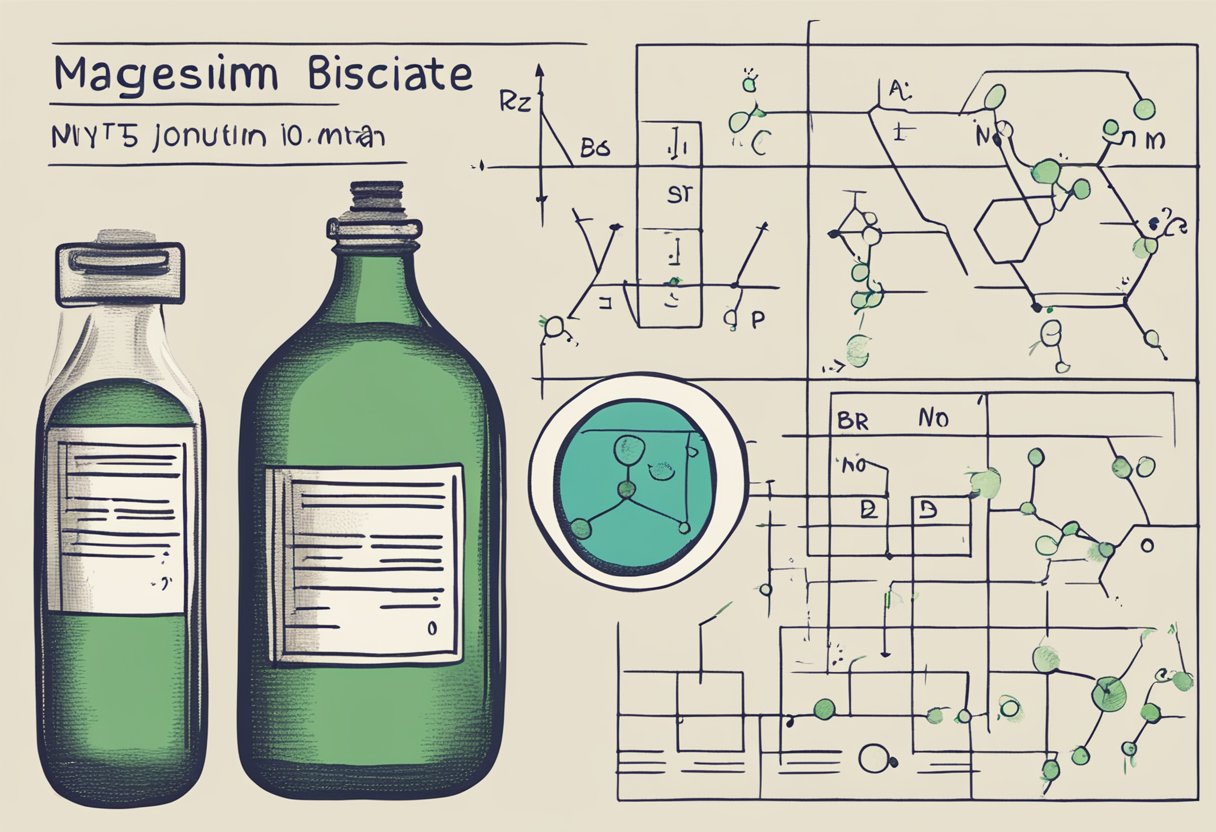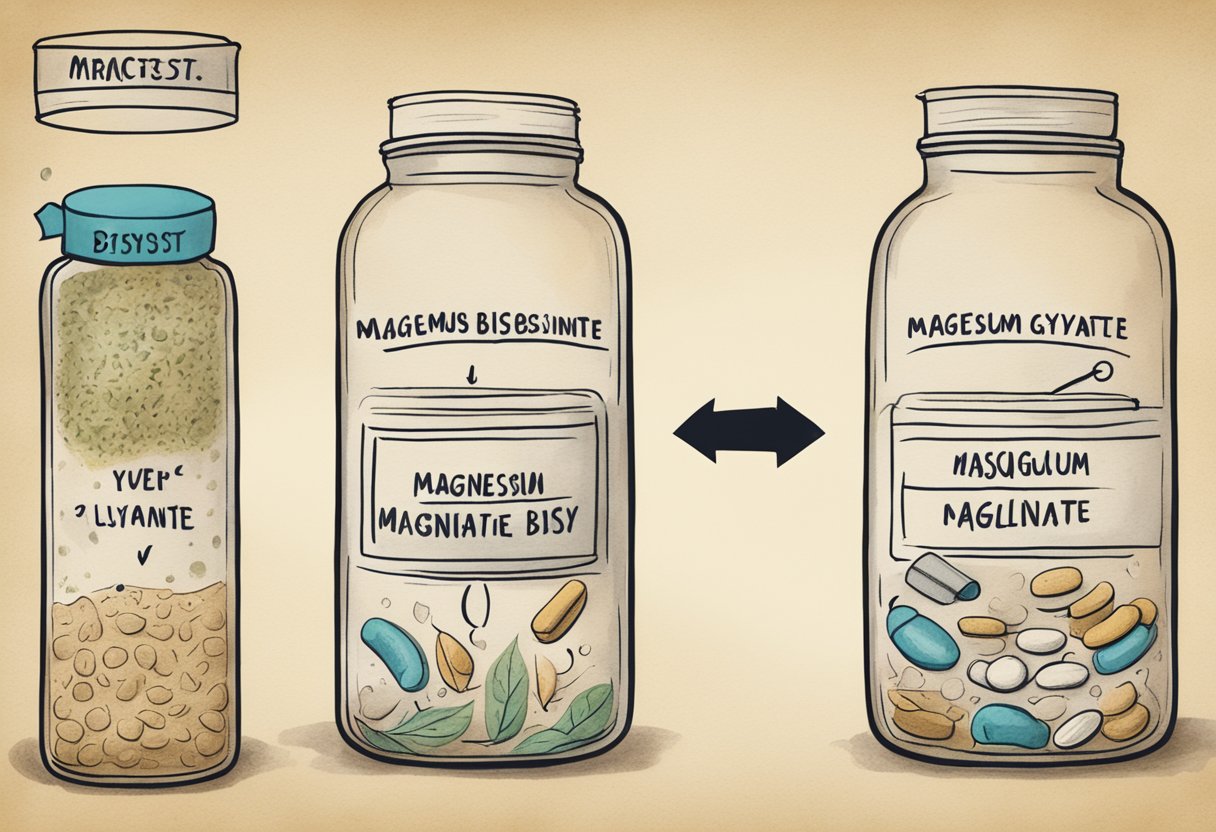Magnesium is a vital mineral for numerous bodily functions, and its supplementation has become popular for those seeking to correct deficiencies or improve overall health.
In the quest for optimal absorption and bioavailability, various forms of magnesium supplements have been developed, two of which are magnesium glycinate and magnesium bisglycinate.
These compounds are often discussed in the context of their effectiveness and benefits, which are influenced by the unique chemical structures that dictate how they are absorbed and utilised by the body.

Understanding the differences between these two forms is crucial for consumers and healthcare professionals alike.
Magnesium glycinate is recognised for its beneficial role in supporting muscle relaxation, improving sleep quality, and enhancing mental calmness.
Conversely, magnesium bisglycinate is frequently highlighted for its enhanced bioavailability—a result of being a chelated form of magnesium, where the mineral is bound to two glycine molecules.

The comparison of magnesium glycinate versus bisglycinate involves dissecting scientific studies and anecdotal evidence to ascertain which form may be more suitable for various health needs.
While the terms are sometimes used interchangeably due to their similar-sounding nature, discerning the specific attributes of each can guide individuals in making an informed choice about their supplementation regimen.
What Is Magnesium Glycinate?
Magnesium glycinate is a dietary supplement that consists of the mineral magnesium attached to glycine, a naturally occurring amino acid.
This formulation is designed to enhance bioavailability, which refers to the body's efficiency in absorbing magnesium.
Magnesium is a crucial element that plays a pivotal role in over 300 enzymatic reactions within the body. It is necessary for bone health, muscle function, and nervous system regulation among others.
However, the body does not produce magnesium and must obtain it through foods or supplements.
Glycine serves as a gentle carrier for magnesium, facilitating its entry into the bloodstream and cells:
-
Glycine Attributes:
- Non-essential amino acid
- Contributes to a calming effect on the brain
- May improve sleep quality
- Supports gastrointestinal health
The term magnesium bisglycinate often appears interchangeably with magnesium glycinate. The prefix "bis" suggests that each magnesium atom is chelated to two glycine molecules, but in practice, the terms refer to the same compound.
Unlike some other forms of magnesium, the glycinate form is less likely to cause digestive upset due to its better absorption rate.
Elemental magnesium refers to the pure form of magnesium, which, when chelated with glycine, is more readily utilised by the body, thereby increasing the efficacy of the supplement.
The popularity of magnesium glycinate is attributed to its high bioavailability and minimal gastrointestinal side effects, making it a preferable choice for those looking to increase their magnesium intake.
What Is Magnesium Bisglycinate?
Magnesium bisglycinate is a form of magnesium in which the mineral is bound to two molecules of the amino acid glycine. This "chelated" form of magnesium tends to be more bioavailable than other forms, making it easier for the body to absorb and utilise.
Chelation is a process that stabilises the magnesium ion, shielding it from interactions that might inhibit absorption.
Glycine itself is recognised for promoting sleep and providing a calming effect on the brain. When magnesium is chelated with glycine, the compound overall may have a soothing effect on both the body and mind.
Properties of Magnesium Bisglycinate:
- Form: Chelated
- Composition: Magnesium + Glycine
- Bioavailability: Higher compared to non-chelated forms
- Benefits: Supports muscle relaxation and a feeling of calm
The chelation process enhances the magnesium's overall absorption rate, thus making magnesium bisglycinate a favourable choice for those with deficiencies or individuals seeking to increase their magnesium intake effectively.
Comparing Absorption and Bioavailability

When discussing magnesium glycinate versus bisglycinate, it is essential to clarify that both compounds are often used interchangeably due to the bisglycinate form being a type of glycinate. They refer to magnesium bonded with glycine, which is intended to enhance absorption and bioavailability.
Absorption refers to the ability of magnesium to pass from the digestive system into the bloodstream.
Bioavailability, on the other hand, relates to the proportion of magnesium that is absorbed and utilised by the body's systems.
Research indicates that the bisglycinate form of magnesium may offer superior absorption and bioavailability.
The small intestine is the primary site for magnesium absorption. Here are some factors affecting the bioavailability of these two forms of magnesium:
- Magnesium bisglycinate has been shown to have a high level of bioavailability, potentially due to its chelated form that protects it from interacting with other dietary factors that might inhibit absorption.
- Magnesium glycinate is thought to be a highly bioavailable form of magnesium as well, due to the efficient way it is transported through the intestinal wall.
When comparing the two on a molecular level, it is the efficiency of absorption that may differ slightly.
Studies, such as one on the bioavailability of different forms of magnesium, have aimed to ascertain these differences, but often assert the enhanced bioavailability of chelated forms like bisglycinate.
Health Benefits and Efficacy

Magnesium glycinate and bisglycinate are both praised for their high absorption rates, which contribute significantly to various health benefits. They are particularly noted for their roles in bone health, muscle function, mental well-being, and cardiovascular health.
Bone Health
Magnesium is a critical mineral for maintaining strong bones, as it is involved in bone formation and influences the activities of osteoblasts and osteoclasts, cells responsible for the health of the bone matrix.
Supplements such as magnesium glycinate are therefore often recommended to support bone health and may be beneficial in addressing a magnesium deficiency.
Muscle Function
Proper muscle function is imperative, and magnesium plays a crucial role in neuromuscular signals and muscle contractions. It can help alleviate muscle cramps and spasms. For this reason, both forms of magnesium are essential in supporting muscle health.
Sleep and Anxiety
Studies suggest that sufficient magnesium levels can improve sleep quality and help manage anxiety.
Magnesium glycinate, in particular, is proposed to have a calming effect on the brain due to the presence of glycine, potentially aiding individuals in achieving better sleep and maintaining good mental health.
Cardiovascular Health
Magnesium's role in heart health is tied to its capability to help regulate blood pressure.
By relaxing blood vessels and improving blood flow, these magnesium supplements can contribute positively to a healthy cardiovascular system.
Side Effects and Interactions
When considering the use of magnesium supplements such as magnesium glycinate or bisglycinate, awareness of potential side effects and drug interactions is essential. Both forms are generally well-tolerated, but they can cause some digestive side effects.
Side Effects:
- Digestive disturbances: Individuals may experience mild to moderate gastrointestinal symptoms, including diarrhoea, nausea, and sometimes a laxative effect. However, these supplements are often preferred for their lesser laxative impact compared to other forms of magnesium.
Interactions:
Magnesium glycinate and bisglycinate might interact with various medications.
- Diuretics: Concurrent use can alter magnesium levels, requiring monitoring.
- Specific medications: Their absorption can be affected as magnesium can bind with certain drugs, reducing their efficacy.
Cautionary Notes:
It is advisable for individuals on medication to consult with a healthcare provider before commencing these supplements to avoid adverse interactions. Monitoring is recommended to preclude the exacerbation of any side effects.
Dosage and Administration
When considering magnesium supplements, specifically magnesium glycinate and magnesium bisglycinate, it is crucial to understand the appropriate dosage and administration.
These forms of magnesium are favoured for their enhanced bioavailability and reduced gastrointestinal side effects.
Dosage The recommended daily intake of magnesium varies depending on age, gender, and life stage.
Adult males require around 300-400 mg per day and females need 270-320 mg.
Magnesium glycinate supplements often come in 100-150 mg tablets or capsules. Healthcare professionals may suggest taking multiple doses throughout the day to meet daily requirements and improve absorption.
Magnesium bisglycinate, touted for its superior absorption due to being a chelated form of magnesium, allows for a more efficient uptake by the body.
The specific dosage of magnesium bisglycinate may vary based on the concentration of the product but typically aligns closely with that of magnesium glycinate.
Administration Both magnesium glycinate and bisglycinate are to be taken orally, with water, and can be consumed with or without food.
However, taking magnesium with a meal may decrease the risk of stomach upset and improve the digestive process.
| Form | Dosage Suggestion | Administration Time |
|---|---|---|
| Magnesium Glycinate | 100-150 mg tablets, multiple times a day | With or without meals |
| Magnesium Bisglycinate | Depends on product concentration | With meals to minimise stomach upset |
Patients are advised to avoid exceeding the upper intake level of 350 mg per day from supplements to prevent adverse effects.
It is also recommended to consult a healthcare provider before starting any new supplement regimen for personalised advice based on individual health needs.
Magnesium in Diet
Magnesium is a vital mineral essential for numerous bodily functions, including muscle and nerve function, blood glucose control, and bone health. The bioavailability of magnesium in the diet greatly influences its overall benefit to the body.
Natural Food Sources
Magnesium is abundantly found in a variety of natural sources.
Nuts such as almonds and cashews, seeds including pumpkin and chia, as well as spinach and other leafy greens, are among the top magnesium-rich foods.
People can significantly contribute to their recommended dietary intake of magnesium by incorporating these foods into their meals.
- Nuts: Almonds, cashews
- Seeds: Pumpkin seeds, chia seeds
- Leafy Greens: Spinach, kale
Supplementation Considerations
When diet alone is insufficient, individuals may turn to dietary supplements to meet their magnesium needs.
Magnesium glycinate and magnesium bisglycinate are compounds often used in these supplements.
Their absorption rates are an important consideration, as they can differ between forms of magnesium.
Magnesium glycinate is reputed for its high absorption rate, potentially offering a beneficial option for those looking to increase their magnesium levels through supplementation.
- Absorption: Magnesium glycinate is highly absorbable.
- Dietary Supplements: Chose based on individual absorption rates and dietary needs.
Understanding Different Forms of Magnesium
When considering magnesium supplementation, it's crucial to distinguish between the various forms available. Each type has different properties affecting its bioavailability, or the ease with which the body can absorb and utilise the mineral.
Organic vs Inorganic Forms
Organic forms of magnesium include compounds such as magnesium citrate, magnesium lactate, and magnesium malate.
These are generally more bioavailable than inorganic forms because they are bound to an organic acid or a fatty acid.
Organic forms of magnesium are considered more gentle on the stomach and are therefore preferred for those with sensitive digestive systems.
- Magnesium citrate: Known for its relatively good bioavailability.
- Magnesium lactate: Often used in food additives and is easier on the digestive system.
- Magnesium malate: Combined with malic acid and is commonly recommended for individuals with fibromyalgia.
In contrast, inorganic forms of magnesium, such as magnesium oxide, magnesium sulfate, and magnesium chloride, might not be absorbed as readily.
However, they are still used in various applications due to their specific benefits or lower costs.
- Magnesium oxide: A common, cost-effective form but with lower absorption rates.
- Magnesium sulfate: Found in Epsom salts, it is often used in baths for muscle relaxation.
- Magnesium chloride: Available in topical forms and is easily absorbed through the skin.
Magnesium Complexes
Magnesium complexes involve the bonding of magnesium ions to other molecules, which can transform its absorption and efficacy.
Magnesium bisglycinate is a notable example, where magnesium is chelated with two glycine molecules. This form of magnesium is known for its high bioavailability and is less likely to cause gastrointestinal discomfort.
- Magnesium taurate: Combines magnesium with taurine, an amino acid that may support cardiovascular health.
Frequently Asked Questions
In this section, we address common queries regarding magnesium bisglycinate, exploring its benefits, absorbability in comparison with magnesium glycinate, effects on sleep, potential side effects, specific demographic cautions, and differences from magnesium citrate.
What are the primary benefits of taking magnesium bisglycinate?
Magnesium bisglycinate is known to support bone health, muscle function, and neurological health. Its chelated form allows for better absorption and minimises laxative effects commonly associated with other forms of magnesium.
Is there a difference in absorbability between magnesium glycinate and bisglycinate?
Both forms of magnesium are chelated, which means they are bound to glycine to enhance absorption.
However, the term "bisglycinate" implies that each magnesium ion is typically bound to two glycine molecules, potentially offering a slight variation in absorption and effectiveness.
Can magnesium bisglycinate improve sleep quality?
Magnesium plays a pivotal role in supporting relaxation and has been linked to improved sleep quality.
Magnesium bisglycinate in particular, due to its superior absorption, may effectively enhance sleep patterns.
What potential side effects might one experience when taking magnesium bisglycinate?
While magnesium bisglycinate is generally well-tolerated, some individuals might experience mild side effects such as gastrointestinal discomfort or diarrhoea.
It is important to adhere to recommended dosages to minimise these effects.
Are there any particular groups of people who should avoid taking magnesium bisglycinate?
Individuals with kidney issues or those currently on medication should consult with a healthcare professional before consuming magnesium bisglycinate.
It's also ill-advised for those with hypersensitivity to any form of magnesium.
In what ways does magnesium bisglycinate differ from magnesium citrate?
Magnesium bisglycinate is particularly noted for its high bioavailability and minimal laxative effect. Meanwhile, magnesium citrate may be selected for its laxative properties. Additionally, magnesium citrate is often used to manage constipation and is not absorbed as well as bisglycinate.
